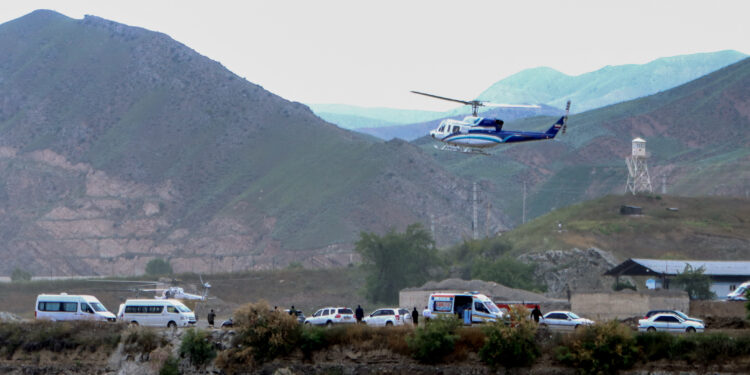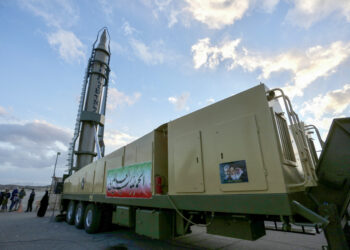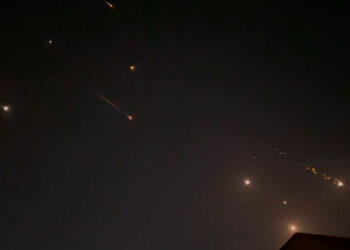Brussels–The Islamic Republic of Iran woke up orphaned by its ultraconservative president, Ebrahim Raisi. The helicopter in which he was traveling crashed last night (May 19) in a mountainous area of Azerbaijan, and all the passengers died with him. In Brussels, there is already debate on the decision to rush to the rescue of the bloodthirsty theocratic regime with the activation of the Copernicus satellite mapping service to search for the helicopter. But EU Commissioner for Crisis Management Janez Lenarčič disagrees: “It is simply an expression of the most basic humanity.”
In addition to the 63-year-old president – who is very close to the Supreme Leader, Ayatollah Ali Khamenei – also Tehran’s Foreign Minister Hossein Amir-Abdollahian, East Azarbaijan Province Governor Malek Rahmati, and Tabriz Friday prayer leader Mohammadali Al-Hashem were on board. The incident site was reportedly a hundred kilometers from Tabriz, in a remote mountainous area of Azerbaijan, where Raisi had traveled to inaugurate a dam with his counterpart Ilham Aliyev.

As early as late Sunday afternoon, several Iranian media outlets broke the news of “an accident” to the presidential convoy without specifying whether Raisi was involved. Around 7 p.m., the EU Commissioner for Crisis Management, Janez Lenarčič, announced the activation of the EU rapid response mapping service, Copernicus, at Tehran’s request, to assist with the complex search operations.
Saudi Arabia and Turkey also offered assistance, and two planes, a helicopter, and 50 men departed from Moscow to search for the missing Iranian delegation. The EU’s decision to offer assistance to a bloodthirsty regime, on which Brussels has imposed ten packages of sanctions over the past year and a half for gross human rights violations and several other restrictive measures for supplying drones and missiles to the Kremlin, immediately stirred controversy. As early as 9 p.m., European Commission spokesman in charge of humanitarian aid and crises Balazs Ujvari clarified in a tweet that “neither the EU Civil Protection Mechanism nor the Copernicus satellite system are driven by political considerations. Any country can request humanitarian or civil assistance through these channels, and the European Commission does its best to help.”

(FILES) Iranian Foreign Minister, Hossein Amir-Abdollahian (R) with EU High Representative for Foreign Affairs, Josep Borrell, in Tehran in 2022 (Photo by ATTA KENARE / AFP)
It is clearly a sensitive point considering the silence of the leaders of the European institutions, except for the president of the European Council, Charles Michel, who, again on his X account, expressed the European Union’s condolences to the families of the victims of the crash. At the time of writing, the EU High Representative for Foreign Affairs, Josep Borrell, is reportedly expected to issue an official statement, but this has been delayed.
The point is so sensitive that Lenarčič intervened again, making it clear that the “provision of a satellite mapping upon request for facilitating a search and rescue operation is not an act of political support to any regime or establishment” but “simply an expression of the most basic humanity.” Meanwhile, in Tehran, Ayatollah Khamenei assured – in a direct message both within the country’s borders and to Iran’s enemies – that there will be no power vacuum, announcing that the Iranian government will continue to operate “without interruption” after the death of President Raisi.
New elections in Iran within 50 days, opposition urges “young rebels to act”
As envisaged by the Iranian Constitution, the Supreme Leader has already given the post of Interim President to Raisi’s deputy, Mohammad Mokhber. He will lead the government for up to 50 days. In this timeframe, there will be new elections. This new scenario is unlikely to open fissures in the totalitarian power of Iran’s Mullahs. However, part of the opposition to the regime is ready to jump at the chance.
Starting with Maryam Rajavi, president-elect of the National Council of Resistance of Iran (Ncri) – an organization that has proclaimed itself a government and parliament in exile since 1981 – that declared: “This represents a monumental and irreparable strategic blow to the Mullahs’ Supreme Leader Ali Khamenei and the entire regime, notorious for its executions and massacres. It will trigger a series of repercussions and crises within theocratic tyranny, which will spur rebellious youths into action.”
English version by the Translation Service of Withub








![Un motoscafo in Svezia. Nell'Ue si pone un problema di mancato riconoscimento delle patenti nautiche [foto:
Matti Blume, Wikipedia Commons. Copyright: Creative Commons Attribution-Share Alike]](https://www.eunews.it/wp-content/uploads/2024/11/motoscafo-Saltsjoen_Stockholm_P1090679-120x86.jpg)
